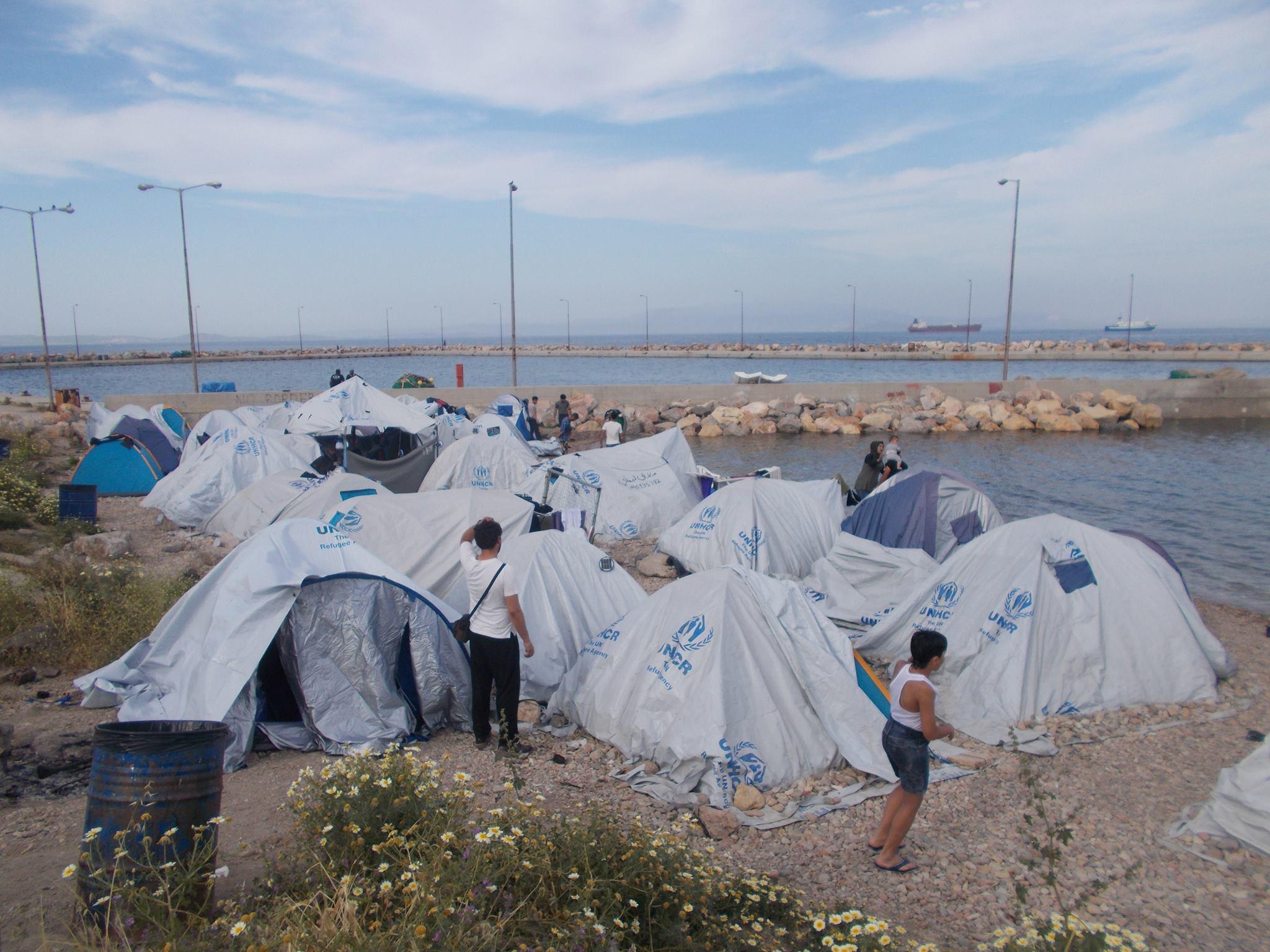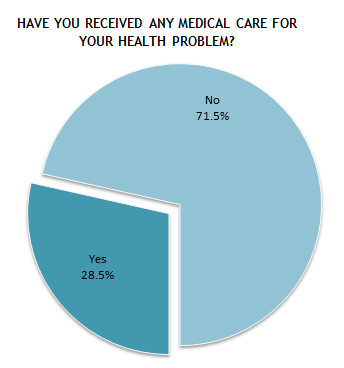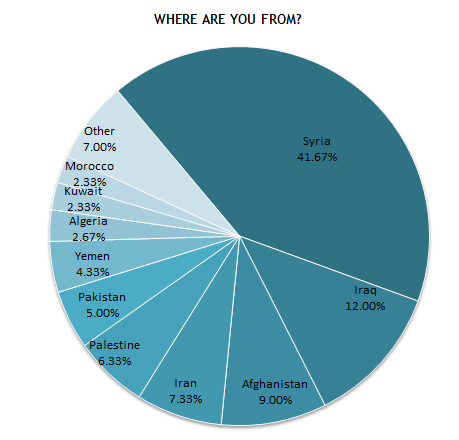One in three refugees on Greek island of Chios has witnessed suicide since arriving, report finds
Exclusive: Charities urge situation is ‘at breaking point’ as research shows one in three has witnessed a suicidal death on island and majority have no access to mental health support

One in three refugees in camps on the Greek island of Chios has witnessed a suicide there, an alarming report has revealed.
Research seen exclusively by The Independent shows 39 per cent of displaced people living on Chios – of whom there are an estimated 3,782 – have witnessed a death on the island, with 87 per cent of these saying it had occurred due to self-harm or suicide.
One refugee said he saw someone set himself on fire, telling researchers: “I saw one person setting himself on fire, and maybe I’ll be the next one. I feel so bad and depressed.”
The report by the Refugee Rights Data Project (RRDP), based on 300 interviews with refugees on Chios, found that seven in ten (71 per cent) respondents had experienced mental health problems since arriving, and that less than a third of them (29 per cent) had been able to access medical care.
The figure was even higher for women, who made up 12 per cent of those interviewed, with 94 per cent of them having experience mental health problems since arriving and less than a third (30 per cent) having been able to access support.

The findings are of particular concern following reports that thousands of refugees in Greece are at risk of losing vital support as charities prepare to withdraw services from the country’s “hotspot” islands, such as Chios, as changes to EU funding are set to leave them out of contract by the end of July.
While NGOs on Greek islands have until now received millions of euros from the European Commission’s humanitarian division (Echo) to provide services to refugees, the changes will see the allocation of funding, as well as the selection of projects to be funded, become the sole responsibility of the Greek authorities.
Charities on the island have now warned that in the light of the new findings, withdrawals of services will have a “detrimental and inhumane” effect on people’s lives, and urged that health, safety and human rights of the displaced people arriving must now be the “highest priority”.
As well as concerns over the lack of mental health care to support the large number of refugees with psychological problems, the report revealed issues surrounding safety on the island.
Eighty-five per cent of refugees said they “never feel safe” or “don’t feel safe” on Chios, while only three per cent saying they “feel perfectly safe”. Nearly a quarter (24 per cent) of respondents said they had experienced police violence, and many told researchers the police treated refugees “like animals”.
A similar proportion (22 per cent) said they had experienced violence by Greek citizens on Chios, often from anti-immigrant groups staging demos on the island, which have been known to escalate into violence against refugees.
Thirty-seven per cent meanwhile said they had experienced violence by other refugees – often described as the result of exhaustion and tensions in overcrowded camps, combined with an absence of adequate security measures in and around the camps.
Half of the children interviewed were unaccompanied, with nearly three quarters (73 per cent) saying they didn’t feel safe in the camp and more than a quarter (29 per cent) saying they had witnessed someone dying on the island, according to the report.
More than a third of the under-18s interviewed were recorded as having experienced mental health problems, but just 18 per cent had received medical care, and only 17 per cent had been offered access to advice about their rights and possibilities to change their situation. Nearly three quarters (73 per cent) said they had family somewhere in Europe.

The UNHCR estimated that there were 3,782 refugees on the island at the time of the study. Of these, 42 per cent were from Syria, 12 per cent from Iraq, nine per cent from Afghanistan and the remaining from a number of other countries including Iran, Palestine, Pakistan and Yemen, according to the report.
The RRDP interviewed approximately 10 per cent of the refugee population on Chios. Of the respondents, 88 per cent were male and 12 per cent female, and the average age was 27, with 10 per cent being children aged 17 of under, including some female minors.
The average time respondents had spent on Chios was three months, with seven per cent having been there for a year or longer, and only a third of respondents residing on the island with family members. Seven in 10 of respondents told researchers they had family elsewhere in Europe.
The majority of refugees interviewed said there was a severe lack of access to information, with 86 per cent saying they had no access to information about their legal rights and opportunities to change their situation, while 78 per cent said they couldn’t access information about European asylum law and immigration rules.
Almost half (41 per cent) of refugees questioned had not yet been able to submit their asylum application at the time of the study, while five per cent of them had had their application rejected and were awaiting deportation.
Almost all (95 per cent) of respondents said they were unable to go back to their home country due to fears of war, persecution or other. When asked about how they felt about being in Europe currently, seven in 10 said they felt “very bad” or “bad”.
Commenting on the findings, Johanna Puhakka, RRDP research coordinator, said it was evidence that the island of Chios is "at breaking point", and urged that the proposals for NGOs to withdraw from providing services was "misguided" and required "urgent" reconsideration.
“Our research indicates that Chios is currently at breaking point. This small island is overcrowded, and the organisations and agencies operating there are clearly struggling to provide some of the most basic services required," said Ms Puhakka.
“The decision of humanitarian organisations to withdraw from the island in June therefore appears critically misguided and needs to be urgently reconsidered.”
Sarah Story, co-founder of charity Refugee Info Bus, echoed the urgency of the situation, saying: “The health, safety and human rights of the displaced people arriving on Chios must be our highest priority right now.
“Increased resources and services need to be allocated – not reduced. Any further withdrawals of services will have a detrimental and inhumane effect on people’s lives on Chios, given that this island is indeed, at breaking point.
She added: "If new services are not introduced, then transfers from Chios to mainland Greece must be accelerated. Moving families and vulnerable people off the island must be urgently prioritised."
Join our commenting forum
Join thought-provoking conversations, follow other Independent readers and see their replies
Comments
Bookmark popover
Removed from bookmarks